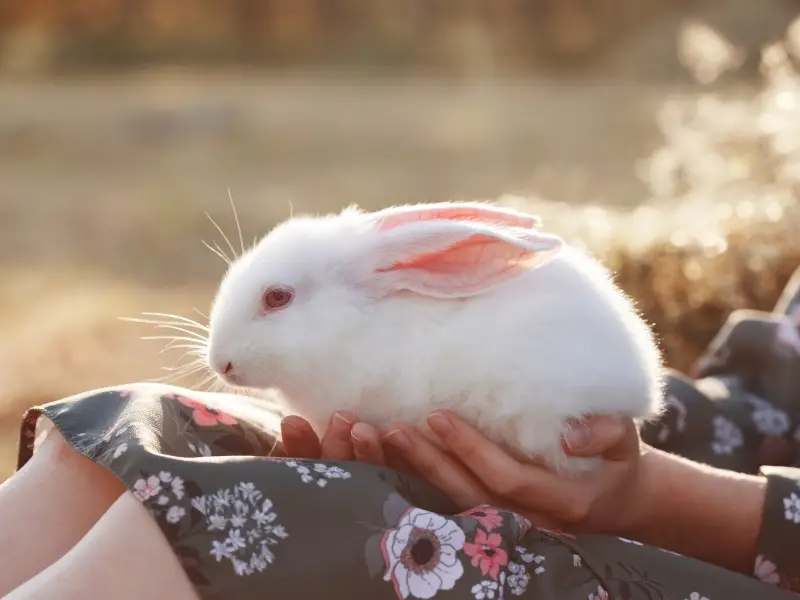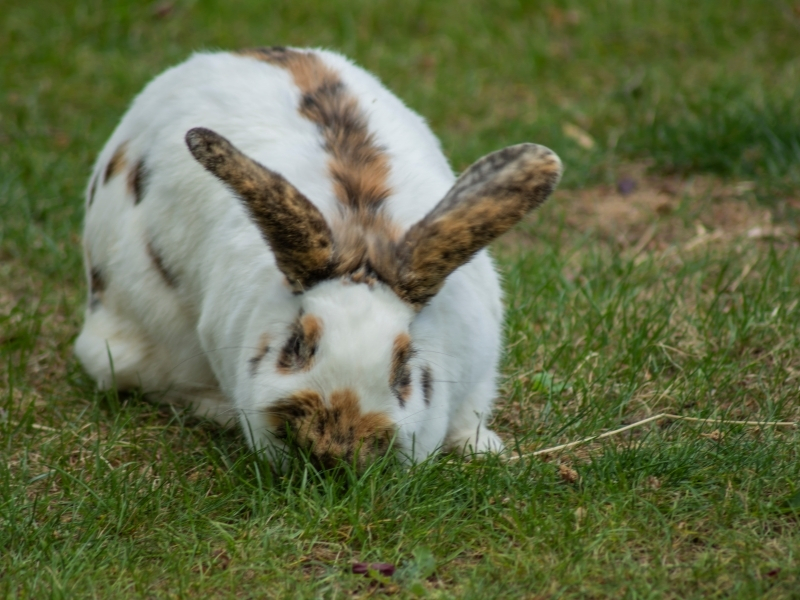Rabbits make great companions to people of all ages and are commonly kept as pets. If you are thinking of getting a pet rabbit, you’re probably curious to learn what their average life expectancy is.
So, how long do rabbits live? Domestic rabbits have an average lifespan of eight to 12 years. However, there are many different breeds of rabbits and each has a different lifespan. While small breeds of rabbits tend to live longer than giant breeds things such as diet and lifestyle can affect the lifespan of a pet rabbit.
Whether you are thinking of getting a rabbit or you’ve had one for years, understanding their lifespan can help you care for your bunny properly. Keep on reading to find out what you can do to help your bunny live longer.
Factors That Affect a Rabbit’s Lifespan
Unlike wild rabbits that on average live for one to two years, pet rabbits have an average life expectancy of eight to 12 years.
This is mainly because pet rabbits have regular food and shelter. Wild rabbits, on the other hand, are constantly running from predators and living in a state of never-ending fear.
Besides being properly cared for and having a permanent home, there are several other factors that can affect your rabbit’s lifespan. They are:
Breed
There are many different breeds of rabbits. But, some rabbit breeds are known to live longer than others.
While there is not enough research to know for sure, it’s believed that like giant dog breeds, larger breeds of rabbits tend to live shorter. Small and dwarf rabbits, on the other hand, generally end up living a long life when properly cared for.
It’s worth mentioning that mixed-breed rabbits tend to live longer than their purebred counterparts.
But remember, every rabbit is different! A small rabbit may end up living only seven years, while a giant bunny may live over 10 years. When it comes to lifespan, the breed isn’t the only factor that affects its length.
Health
Many things can influence your rabbit’s overall health and have an effect on its lifespan. All rabbits can develop health problems or get parasites which can shorten their lifespan if not diagnosed and treated in time.
Cleaning your rabbit’s cage regularly and keeping it clean is a must and will help you keep your bunny happy and healthy. Also, remember to wash your hands before and after handling, feeding, or playing with your rabbit.
Taking your rabbit to regular veterinary checkups can help you catch any health problems early on and start treating them in time.
Practicing good hygiene and staying on top of your pet rabbit’s yearly checkups can do wonders for their overall health and lengthen their lifespan.
Nutrition
Like all other animals, rabbits have specific nutritional requirements. The type of food that you are feeding your rabbit has a direct influence on their lifespan.
Diet plays a major role in the overall health of your rabbit. If your bunny isn’t receiving all essential nutrients from its diet, it won’t be healthy or able to live long.
An ideal diet for a rabbit should consist of hay, commercial pelleted diets for rabbits, fruits, and vegetables. Although many owners opt to feed only rabbit food from the pet store, these types of food may be low in vitamins and minerals your rabbit needs to stay healthy.
Lifestyle
While most people think that a rabbit can happily spend its entire life living in a cage, that’s not really the case. House rabbits need a lot of space and mental stimulation to stay exercised and active.
Whether kept indoors or outdoors, pet rabbits still need a lot of room to move around and toys they can chew and play with. Bunnies that live without environmental enrichments and enough space to move freely may not live as long as they could.
How to Take Care of Your Rabbit?

Despite common beliefs, rabbits aren’t low-maintenance pets. Furthermore, how long your rabbit will live depends greatly on how well you are caring for them.
There’s more to caring for your bunny than keeping it fed and exercised! Listed below are a few tips that can help your pet rabbit live longer:
Keep Cages Clean
Rabbits can create a lot of mess in no time, so you’ll need to practice good hygiene by regularly cleaning their cages. Clean urine, feces, and soiled bedding every day, and strive to completely clean and replace the entire bedding once a week.
Besides being inhumane, keeping a rabbit in a dirty cage will result in contagious diseases that can lead to premature death and shorten your pet’s lifespan.
Provide Veterinary Care
While rabbits are fairly common pets, they are still widely regarded as small animals or exotic pets. Depending on where you live, you might need to look for a specialist veterinarian that has a lot of experience treating rabbits in particular.
The advances in veterinary care are one of many reasons why pet rabbits live longer. Take your rabbit to the vet as soon as you get it and continue going to yearly checkups as a preventative measure.
Young and healthy rabbits can go to the vet once a year, but elderly rabbits may need frequent veterinary visits. Senior rabbits can experience major health problems in a short amount of time, so it’s important to take your elderly rabbit to frequent vet visits.
Spay or Neuter Your Rabbit
Like with all other animals, spaying or neutering can increase your bunny’s life expectancy. Unfixed rabbits have a constant desire to mate, which puts their entire bodies under stress and makes them more susceptible to illnesses.
Female rabbits that aren’t spayed and aren’t bred regularly have a higher risk of developing uterine tumors. Male rabbits, on the other hand, can develop testicular cancer if not neutered.
What Do Rabbits Usually Die from?
There’s no guarantee that your rabbit won’t get sick and die, even though you are caring for it properly. Whenever your rabbit exhibits signs of illness or starts behaving out of the ordinary, consult your vet and take the bunny for a checkup.
Gastrointestinal stasis happens quickly and is one of the most common causes of death in rabbits. Stress, dehydration, and blockage are some of the causes of this condition that are accompanied by loss of appetite and smaller droppings than usual. If you notice these symptoms, take your rabbit to the vet right away!
Other common causes of death include heat stroke, poisoning, injury, infectious disease, cancer, and stress-induced heart attack.
With that being said, here are the most common illnesses in rabbits:
Overgrown Teeth
Rabbits have rootless teeth that grow continuously during the course of their lives. When a rabbit doesn’t have adequate things to chew on, its teeth can become overgrown.
Overgrown teeth can be extremely painful and cause your rabbit to stop eating and potentially die of starvation.
Eating a diet rich in hay can help file your rabbit’s teeth naturally and keep them short. However, if your rabbit already has problems with overgrown teeth, take it to the vet who will file the teeth down.
Snuffles
Rabbits that live in dirty hutches and cages can easily develop pasteurellosis or snuffles. While it looks like a common cold, snuggles is, in fact, a bacterial infection of the tear duct and nasal sinuses (source).
If your rabbit exhibits any symptoms of this disease, take it to the vet who will prescribe antibiotics as a course of treatment.
Uterine Tumors
As mentioned previously, unspayed female rabbits that aren’t bred regularly are at a higher risk of developing uterine tumors. If your female rabbit isn’t spayed but is sick, there is always a chance that she might have cancer.
The good news is that most female rabbits are completely cured with spaying surgery and don’t require any additional treatment.
Myxomatosis
Myxomatosis is a flea and mosquito-borne disease that is usually fatal in rabbits. Outdoor rabbits are at a higher risk of contracting this disease than indoor rabbits.
Consider keeping your rabbits indoors only where they will be protected against disease-ridden fleas and mosquitoes. However, if this isn’t an option, protect your rabbit’s enclosure with mosquito netting and make sure that your bunnies are protected whenever they are outside.
Conclusion
Pet rabbits have never lived longer! That’s mainly because of the quality of care they receive from their owners and better access to veterinary care.
With a proper diet, good living conditions, and regular exercise, your pet rabbit can easily live more than a decade with you!
But don’t forget that breed can have a big impact on a rabbit’s life expectancy and that small rabbit breeds generally live longer than large and giant rabbits.
Related Articles:

